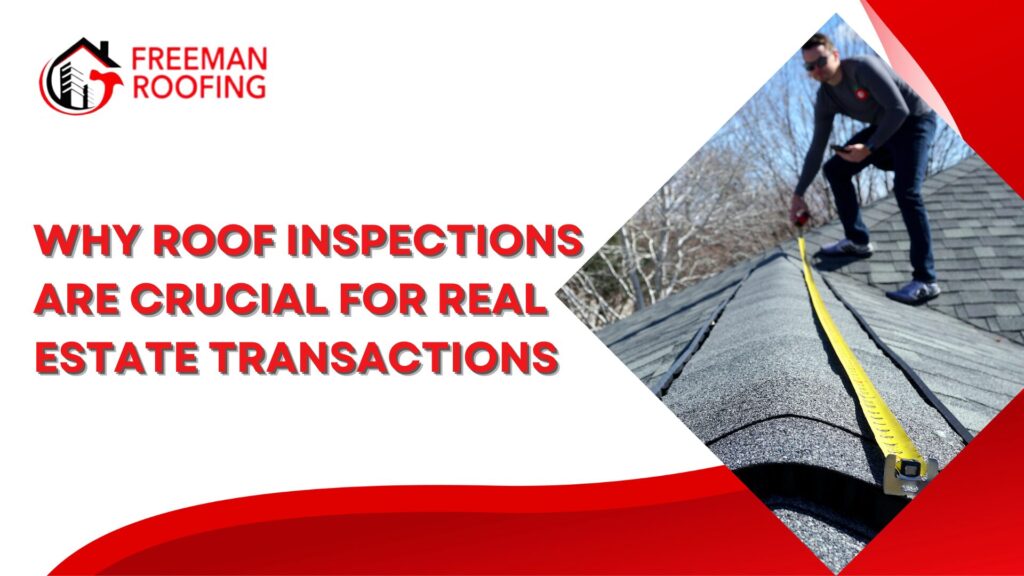Why Roof Inspections Are Crucial for Real Estate Transactions

Buying or selling a home? Don’t overlook the roof! A solid roof can make or break a deal, and a professional inspection ensures that both buyers and sellers know exactly what they’re getting into. Roof inspections for home buyers provide peace of mind, while sellers can avoid last-minute surprises. Let’s dive into why roof inspections are non-negotiable in real estate transactions.
The Role of Roof Inspections in Real Estate
A roof inspection evaluates the condition, lifespan, and potential issues of a property’s roof. Unlike a standard home inspection, which covers general aspects of a house, a roof inspection takes a closer look at leaks, missing shingles, structural integrity, and more. Understanding the importance of roof inspections
- Protects Buyers from Hidden Issues: A house may look perfect from the outside, but hidden roof problems can lead to unexpected expenses. A thorough inspection ensures buyers aren’t inheriting costly repairs. If issues arise, buyers can negotiate repairs or a price reduction.
- Boosts Seller Credibility: Sellers who provide a roof inspection report demonstrate transparency, which builds trust with buyers. It also speeds up the closing process by reducing buyer hesitation.
- Avoids Delays in the Closing Process: Undiscovered roof issues can halt a real estate transaction. Lenders and insurance companies often require a roof in good condition before approving financing.
- Increases Home Value: A well-maintained roof adds value to a home. If an inspection reveals a roof in excellent condition, sellers can justify a higher asking price.
- Ensures Insurance Compliance: Many homeowners insurance providers require proof of a roof’s condition before issuing a policy. If an inspection reveals major damage, buyers may struggle to secure coverage.
Identifying Common Roof Problems
Certain areas of your roof are more prone to damage:
- Valleys: Where two roof slopes meet; debris can accumulate, causing water to pool.
- Ridge Caps: The peak of your roof; damaged caps can lead to leaks.
- Around Penetrations: Areas where pipes, vents, or chimneys protrude; flashing can deteriorate over time.
Addressing Minor Roofing Issues
For small problems, DIY repairs can suffice:
- Replace Missing Shingles: Lift the damaged shingle, remove nails, and slide a new one into place.
- Seal Small Leaks: Apply roofing sealant to minor cracks or holes.
When to Call a Professional Roofer
Some situations require expert attention:
- Extensive Damage: Large areas of missing shingles or widespread leaks.
- Structural Concerns: Sagging roofs or signs of water damage inside your home.
- Safety Hazards: If accessing your roof is dangerous, it’s best to hire a professional.
Preventative Roof Maintenance
Taking proactive steps can extend your roof’s lifespan:
- Regular Cleaning: Remove debris from gutters and valleys to ensure proper drainage.
- Trim Overhanging Branches: Prevent damage from falling limbs and reduce debris accumulation.
- Install Gutter Guards: Minimize debris buildup and reduce maintenance needs.
The Bottom Line
Regular inspections and timely repairs are key to maintaining a strong, leak-free roof. By staying vigilant and addressing issues promptly, you can protect your home and avoid costly repairs down the line.
For more information on roofing and home maintenance, check out these resources:
- HomeAdvisor’s Guide to Roof Maintenance – This resource provides comprehensive information on roof maintenance tips and best practices.
- NRCA Roofing Knowledge Center – The National Roofing Contractors Association offers valuable resources and information on all aspects of roofing.
- Energy.gov: Roofing Your Home – This resource from the U.S. Department of Energy provides information on energy-efficient roofing options and best practices.
- Wikihow: How to Inspect a Roof – This article provides a step-by-step guide on how to perform a basic roof inspection yourself.
